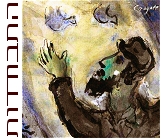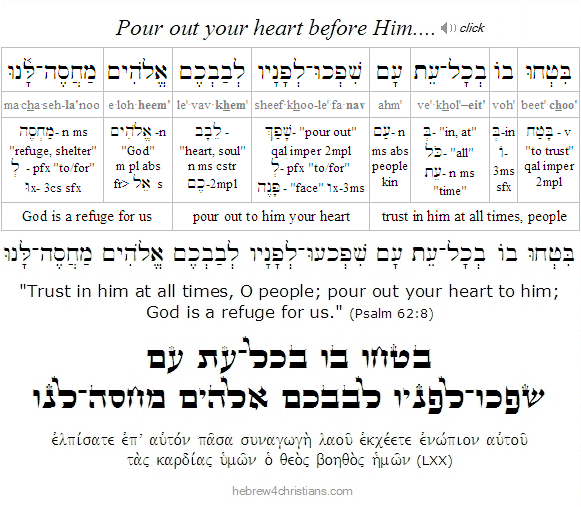|
|
|||||||||||||||||||||
 |
|||||||||||||||||||||
|
Learn Hebrew |
|||||||||||||||||||||
|
|
||||||||||||||||||||||||||||
 |
|||
|
Trust in him at all times, O people; |
|
The Hebrew word "mitzvah" (×ִצְ×Ö¸×) is often translated as "commandment," though its basic idea is about our connection to God (i.e., the root צ×× means to "bind" or "unite"). Being connected with the Almighty means making time to get alone to talk with him, relating to him as your Heavenly Father, and trusting that he genuinely esteems you as his beloved child. Whatever else you may think about the commandments of God, this idea of a love connection is foundational and essential. The very first of the Ten Commandments is Anochi Adonai Elohekha (×Ö¸× ×Ö´× ×Ö°××Ö¸× ×Ö±××Ö¶Ö××Ö¸), "I am the Lord your God," which invites you to open your heart to receive the touch of the Spirit of God. There is no love like that of the Lord, but you simply can't feel that love if you don't speak to Him, pouring out your heart and clinging to the truth of his love for you....
Addendum: We are to pray to God with all our heart (××× ×××), but that must include the broken heart, too - that is, the broken parts of ourselves that somehow find tether to the passion of God's love. We "lift up our soul" to the LORD - all of ourselves - as we pour out our heart before God. Our feelings are important in prayer - the ingredient added to our petitions that quicken the heart and focus the will.... "Return, O Israel, to the LORD your God" (Hos. 14:2) means returning to the place of heartfelt faith - where the LORD is your God, and you are his beloved child.
|
|
Hebrew for Christians |
|||||
|
|||||

